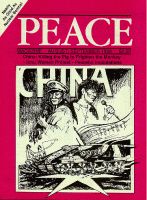
Peace Magazine Aug-Sep 1989, page 6. Some rights reserved.
Search for other articles by Barry Stevens here
MOSCOW, APRIL 10, 1990 - President Mikhail S. Gorbachev announced yesterday that the Soviet Union would unilaterally scrap all its land, air, and sea-based nuclear warheads. As he spoke, technicians behind him dismantled a brand new SS-25 missile. Foreign reporters all over the Soviet Union watched missile after missile being destroyed.
U.S. Secretary of State James Baker, visiting NATO bases in West Germany, said that this initiative was "encouraging" but that the West should "guard against moves meant to weaken NATO's unity. The Soviets still have vastly superior conventional forces. If Gorbachev was really sincere, he'd take all tanks and troops from Europe."
Hours later, Gorbachev announced another bold move, pledging to return all troops to the Soviet Union, scrap its tanks, helicopters, artillery pieces, fighter aircraft, and all ships and submarines except coastal patrol boats. As he spoke, whole divisions in East Germany, Czechoslovakia, and Hungary began to pack up and drive home.
U.S. Secretary of Defense Dick Cheney, visiting a California base where another B-2 Stealth bomber recently disintegrated while being rolled out of its hangar, commented that this was "a propaganda move. How do we know he really intends to do it?" When reporters told him that troops were already leaving and that tanks were being sold for scrap or converted into amusement park rides in Prague, he added, "Well, those patrol boats can be deadly. Plus, all those soldiers are still Communists, even if they don't wear uniforms anymore." Cheney said that if the Soviets were "really, truly sincere" they would destroy all boats and commercial aircraft, renounce Communism, and tear down the Berlin wall.
Early this morning, Gorbachev banned the Soviet Communist Party, burning his party card in front of surprised reporters. Bulldozers tore up runways; coastal vessels were scuttled; and Aeroflot went out of business. Gorbachev pledged to give its fleet of planes, the world's largest, to Eastern Airlines, currently beset by financial troubles. Meanwhile, in Berlin, former East German soldiers tore down the wall and began to build day care centres with the bricks.
U.S. President George Bush, touring a nuclear waste dump in Scotland with Britain's Margaret Thatcher, said the moves were "very heartening," though it was "too early to tell" whether Gorbachev was "really, truly, completely sincere." Thatcher agreed, saying: "There's no doubt Gorbachev's got balls, and we can all admire that. But let's not forget the enslaved Baltic republics, Georgia, Armenia, and so on." Bush said that unless Gorbachev acted immediately to liberate "Latvonia, Uzmenistan and those places" there could be no peace. "Plus, we gotta have access for business," he insisted.
Late in the afternoon, Gorbachev announced the expulsion of all republics except Russia from the Soviet Union. Many governments of the republics objected, and mass demonstrations of people begged Gorbachev to leave the country intact. Armenia immediately declared war on Azerbaijan and Uzbekistan attacked the Turkmen SSR. But Gorbachev held firm. "You're on your own, my friends," he said. Then he announced a massive sell-off, at bargain prices, of the land, resources, and physical plant of Russia. In a joint announcement with Donald Trump of New York he welcomed the return of serfdom. Trump, who will turn the Kremlin into a giant casino and resort, said, "Mike here is going to be the head croupier."
In Ontario, farmer Bob Romanov got a call from Mr. Gorbachev, asking him to come back and "pick up where Nicholas I left off." Romanov, 54, the most direct descendant of the late Emperor still living, said he and Gorbachev were chatting about marketing turnips when the former leader made the surprise offer. "I don't mind being Czar," he said, "as long as I can still go to Lauderdale every winter."
In Washington, President Bush emerged smiling from a meeting with leading arms manufacturers. "We feel encouraged by developments in the Soviet Union - I mean Russia," he said. But he said that it was too early to tell if Gorbachev was "really, truly, completely, utterly sincere." He cautioned against "letting this propaganda offensive lull us into a false sense of security. After all, the Russians still have a massive lead in polyester pants." He promised, however, that the U.S. would not develop new generation of nuclear weapons "any faster than we absolutely have to." When it was suggested to him that there was no longer any reason for the current level of military spending, Bush said, "What about Libya? Nicaragua? And Canada? People forget all about the world's longest undefended border. No, America must stand firm against all threats."
He outlined plans for a new multi-billion dollar research program, to be called "How to Make People Die." Then he hurried away to shop for a gift for the Czar's coronation.
Barry Stevens is an actor and writer.

Peace Magazine Aug-Sep 1989, page 6. Some rights reserved.
Search for other articles by Barry Stevens here